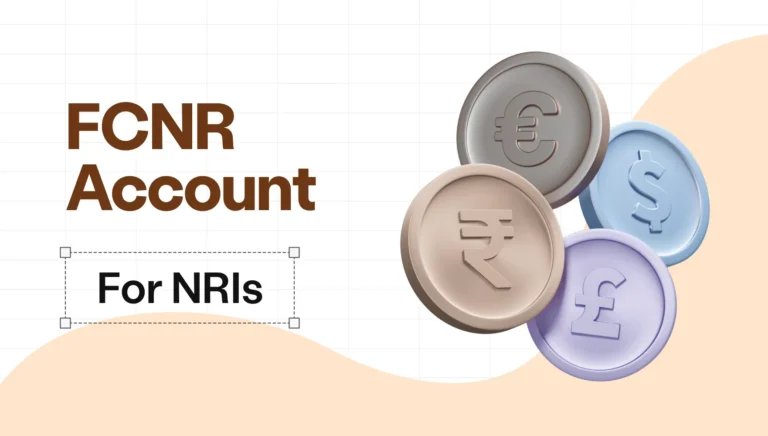Managing finances as a Non-Resident Indian (NRI) often involves dealing with multiple currencies and tax regulations. Protecting your hard-earned money from currency fluctuations and high taxes while still earning returns is a priority but can be challenging. The solution? A Foreign Currency Non-Resident (FCNR) account.
Let’s explore the crucial aspects of an FCNR account that you must know.
What is an FCNR account?
An FCNR account is a type of fixed deposit account specifically designed for NRIs that allows them to hold their deposits in foreign currencies.
For example, IndusInd Bank FCNR Deposits allow you to maintain funds in six different currencies, i.e., the US dollar (USD), British pound sterling (GBP), euro (EUR), Japanese yen (JPY), Australian dollar (AUD), and Canadian dollar (CAD).
You can open the FCNR deposit effortlessly with a completely digital process, and enjoy benefits like competitive interest rates, flexible tenures, excellent customer service, and a range of personalised services at your fingertips.
FCNR account benefits and top features
Full repatriation: Both the principal amount and the interest earned on FCNR deposits are fully and freely repatriable. This helps you transfer funds back to your country of residence without any restrictions.
Tax exemption: The interest earned on FCNR accounts is exempt from income tax in India. This makes it a tax-efficient way for NRIs to earn interest on their foreign currency holdings without worrying about double taxation.
Compounded interest: Interest on FCNR deposits is compounded every 180 days, which helps boost the overall returns on your investment over time.
Flexible tenures: FCNR deposits offer flexible tenures ranging from a minimum of one year to a maximum of five years. Note that you need to keep your FCNR deposit for a minimum of one year to earn interest.
Is the joint holding of FCNR accounts allowed?
Yes, the RBI authorised NRIs in 2011 to hold FCNR accounts jointly with other NRIs or resident close relatives.
How to transfer funds to FCNR accounts?
To fund an FCNR account, several convenient options are available, such as:
- Initiate a direct transfer from your foreign bank account to the FCNR account via a wire transfer or cheque.
- Transfer money from an existing Non-Resident External (NRE) account to your FCNR account.
- Use foreign currency notes or travellers’ cheques during your visit to India.
Can you prematurely withdraw from an FCNR account?
If you withdraw from an FCNR deposit before completing the minimum required period of one year, no interest will be paid. Moreover, banks may choose to impose a penalty to cover the swap cost associated with the early withdrawal. These conditions and any applicable penalties are outlined in the terms of your deposit agreement.
How to open an FCNR?
| Determine eligibility | Make sure you qualify as an NRI or a Person of Indian Origin (PIO) as per RBI regulations. |
| Complete application | Fill out the application form. |
| Submit the required documents | Provide necessary documents such as passport, visa, proof of NRI status, address proof, and a completed account opening form. |
| Choose the tenure | Decide on the deposit tenure, which can range from one to five years. |
| Fund the account | Initiate a fund transfer to your FCNR account using a wire transfer, a cheque from overseas, or an existing NRE account. |
Key takeaways
FCNR accounts offer NRIs a secure and tax-efficient way to handle their foreign earnings while benefiting from competitive interest rates and full repatriability. By understanding the features, benefits, eligibility criteria, and rules about premature withdrawals, you can use FCNR accounts effectively to grow wealth and achieve your financial goals.
To fully benefit from FCNR accounts, always select a reputable bank and understand your deposit’s terms. Most importantly, consult with financial advisors to optimise returns and stay compliant with regulatory requirements.

